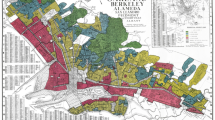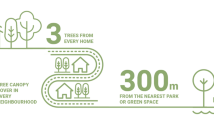Abstract
In this paper we will present lessons learned and examples of empirical findings from an app-based survey in the City of Wuppertal, Germany. The app consists of several complementing modules that look into the individual well-being and community wellbeing of the citizens of Wuppertal. Within 12 months the central questionnaire has been answered 1799 times in full by different individuals. The app is very well known within the city due to partnerships with local enterprises and media. Some first steps towards using the app in decision making have been taken and will be extended. The experience shows great potential of such an approach both for research and new forms of participation but also some challenges in consistently motivating citizens to participate. The results of the survey confirmed some known factors influencing happiness but also showed some interesting patterns relevant both to local decision making and further research.
Similar content being viewed by others
Notes
There are conflicting views on the relationship between broader sets of well-being indicators and happiness. Some see the dimensions of well-being (health, education, etc.) mainly in their contribution to happiness and try to measure that contribution (Veenhoven 2010; Stiglitz et al. 2009:145–151), while work based on the capability approach considers the capabilities as their own ends (Stiglitz et al. 2009: 151–153).
In practical applications, subjective well-being is sometimes included as one of several indicators (e.g. in the Better Live Index, OECD 2013a, b), sometimes considered the outcome of the factors measured (Santa Monica Well-Being, as described in OECD 2017). However, Veenhoven (2010) finds that both a focus on capabilities and one on happiness lead to similar policy prescriptions.
Noise maps are available at geoportal.wuppertal.de
References
Anderson, R. E. (2017). Community functioning that fosters sustainable social well-being. In R. Phillips & C. Wong (Eds.), Handbook of community well-being research (pp. 3–10). Dordrecht: Springer Netherlands. https://doi.org/10.1007/978-94-024-0878-2_1.
Deutscher Bundestag. (2013). Schlussbericht der Enquete-Kommission “Wachstum, Wohlstand, Lebensqualität - Wege zu nachhaltigem Wirtschaften und gesellschaftlichem Fortschritt in der Sozialen Marktwirtschaft.” Berlin.
Centre for Bhutan Studies & GNH Research (2016). A compass towards a just and harmonious society: 2015 GNH survey report.
Constanza, R., Hart, M., Posner, S., & Talberth, J. (2009). Beyond GDP. The need for new measures of progress. The Pardee Papers no. 4. http://www.bu.edu/pardee/files/documents/PP-004-GDP.pdf. Accessed 15 November 2018.
Cuñado, J., & de Gracia, F. P. (2012). Does education affect happiness? Evidence for Spain. Social Indicators Research, 108, 185. https://doi.org/10.1007/s11205-011-9874-x.
Diener, E., Emmons, R. A., Larsen, R. J., & Griffin, S. (1985). The satisfaction with life scale. Journal of Personality Assessment, 49, 71–75.
Diener, E., Wirtz, D., Tov, W., Kim-Prieto, C., Choi, D.-W., Oishi, S., & Biswas-Diener, R. (2010). New well- being measures: Short scales to assess flourishing and positive and negative feelings. Social Indicators Research, 97(2), 143–156.
Easterlin, R. A. (2003). Explaining happiness. Proceedings of the National Academy of Sciences, 100(19), 11176–11183. https://doi.org/10.1073/pnas.1633144100.
Easterly, W. (2015). The trouble with the sustainable development goals. Current History, 3.
Empirica (2007). Stadtumbau-West: Städtebauliches Entwicklungskonzept Wuppertal. available from www.wuppertal.de/wirtschaft-stadtentwicklung/medien/dokumente/Endfassung_25230_Wuppertal_Endbericht1_pdf.pdf, Accessed March 28 2019.
European Commission (2013). Commission staff working document: Progress on “GDP and beyond” actions. Brussels.
Fleurbaey, M., & Blanchet, D. (2013). Beyond GDP: measuring welfare and assessing sustainability. Oxford. New York: Oxford University Press.
Frijters, P., & Beatton, T. (2012). The mystery of the U-shaped relationship between happiness and age. Journal of Economic Behavior & Organization, 82(2), 525–542. https://doi.org/10.1016/j.jebo.2012.03.008.
Helliwell, J., Layard, R., & Sachs, J. (2017). World happiness report 2017. New York: Sustainable Development Solutions Network.
Hendriks, M., Ludwigs, K., & Veenhoven, R. (2016). Why are locals happier than internal migrants? The role of daily life. Social Indicators Research, 125(2), 481–508. https://doi.org/10.1007/s11205-014-0856-7.
Jeffrey, K., Wheatley, K., & Abdallah, S. (2016). The Happy Planet Index 2016: A global index of sustainable wellbeing. London: New Economics Foundation https://static1.squarespace.com/static/5735c421e321402778ee0ce9/t/57e0052d440243730fdf03f3/1474299185121/Briefing+paper+-+HPI+2016.pdf. Accessed 15 November 2018.
Kahneman, D., Krueger, A. B., Schkade, D. A., Schwarz, N., & Stone, A. A. (2004). A survey method for characterizing daily life experience: The day reconstruction method. Science (New York, N.Y.), 306(5702), 1776–1780. https://doi.org/10.1126/science.1103572.
Killingsworth, M. A., & Gilbert, D. T. (2010). A wandering mind is an unhappy mind. Science, 330(6006), 932–932. https://doi.org/10.1126/science.1192439.
Kim, Y., & Lee, S. J. (2014). The development and application of a community wellbeing index in Korean metropolitan cities. Social Indicators Research, 119(2), 533–558. https://doi.org/10.1007/s11205-013-0527-0.
Lane, J.-E. (2016). Decabonisation and sustainable development goals: A Critique of J. Sachs. International Journal of Economics, Commerce and Management, 4(12), 113–141.
Ludwigs, K. (2018). The happiness analyzer. A new technique for measuring subjective well-being. Erasmus University Rotterdam.
Ludwigs, K., & Erdtmann, S. (2019). The happiness analyzer – Developing a new technique for measuring subjective well-being. International Journal of Community Well-Being, 1(2), 101–114.
Ludwigs, K., Lucas, R., Burger, M., Veenhoven, R., & Arends, L. (2018). How does more attention to subjective well-being affect subjective well-being? Applied Research in Quality of Life, 13(4), 1055–1080.
McGuire, S., Posner, S., & Haake, H. (2012). Measuring prosperity: Maryland’s genuine Progress Indicator. Solutions, 3(2), 50–58.
OECD. (2013a). OECD guidelines on measuring subjective well-being. Paris: OECD Publishing.
OECD. (2013b). How’s life? 2013 - measuring well-being. Paris: OECD Publishing.
OECD. (2017). Embracing innovation in government. Global Trends., (February 2017).
Raffelhüschen, B., & Krieg, O. (2017). Deutsche Post Glücksatlas 2017. Albrecht Knaus Verlag.
Sirgy, M. J. (2018). What types of indicators should be used to capture community well-being comprehensively? International Journal of Community Well-Being. https://doi.org/10.1007/s42413-018-0002-4.
Stiglitz, J., Sen, A., & Fitoussi, J.-P. (2009). Report by the Commission on the Measurement of Economic Performance and Social Progress. Paris.
Talberth, J., Cobb, C. W., & Slattery, N. (2007). The Genuine Progress Indicator 2006. Oakland: Redefining Progress.
UK Cabinet Office (2013). Wellbeing policy and analysis: An update of wellbeing work across Whitehall. https://assets.publishing.service.gov.uk/government/uploads/system/uploads/attachment_data/file/224910/Wellbeing_Policy_and_Analysis_FINAL.PDF. Accessed 15 November 2018.
UN General Assembly (2030) A/RES/71/313: Work of the statistical commission pertaining to the 2030 agenda for sustainable development.
United Nations (2014). System of environmental-economic accounting - 2012 central framework. New York. https://seea.un.org/sites/seea.un.org/files/seea_cf_final_en.pdf. Accessed 15 November 2018.
Veenhoven, R. (2010). Capability and happiness: Conceptual difference and reality links. The Journal of Socio-Economics, 39(3), 344–350.
Weinhold, D. (2008). How big a problem is noise pollution? A brief happiness analysis by a perturbable economist. MPRA Working Paper, No., 10660.
Acknowledgements
The work presented in this paper was supported and partly funded by the Forschungsinstitut für Gesellschaftliche Weiterentwicklung, the Stadtsparkasse Wuppertal and the Wuppertaler Stadtwerke. We would like to thank two anonymous reviewers for their suggestions. Both Prof. Uwe Schneidewind and Anna Lohmann provided significant input into the underlying project.
Author information
Authors and Affiliations
Corresponding author
Ethics declarations
Conflict of Interest
We hereby confirm that no one of the authors has any conflict of interest with this publication. Additionally, we declare that this research was conducted in line with the Declaration of Helsinki which explains all main rules for human research ethics.
Additional information
Publisher’s Note
Springer Nature remains neutral with regard to jurisdictional claims in published maps and institutional affiliations.
Appendices
Appendix 1
Appendix 2
Appendix 3
Appendix 4
Rights and permissions
About this article
Cite this article
Haake, H., Ludwigs, K. Happy Wuppertal – Measuring Individual and Community Well-Being on the Urban Scale. Int. Journal of Com. WB 2, 155–176 (2019). https://doi.org/10.1007/s42413-019-00025-x
Received:
Accepted:
Published:
Issue Date:
DOI: https://doi.org/10.1007/s42413-019-00025-x




